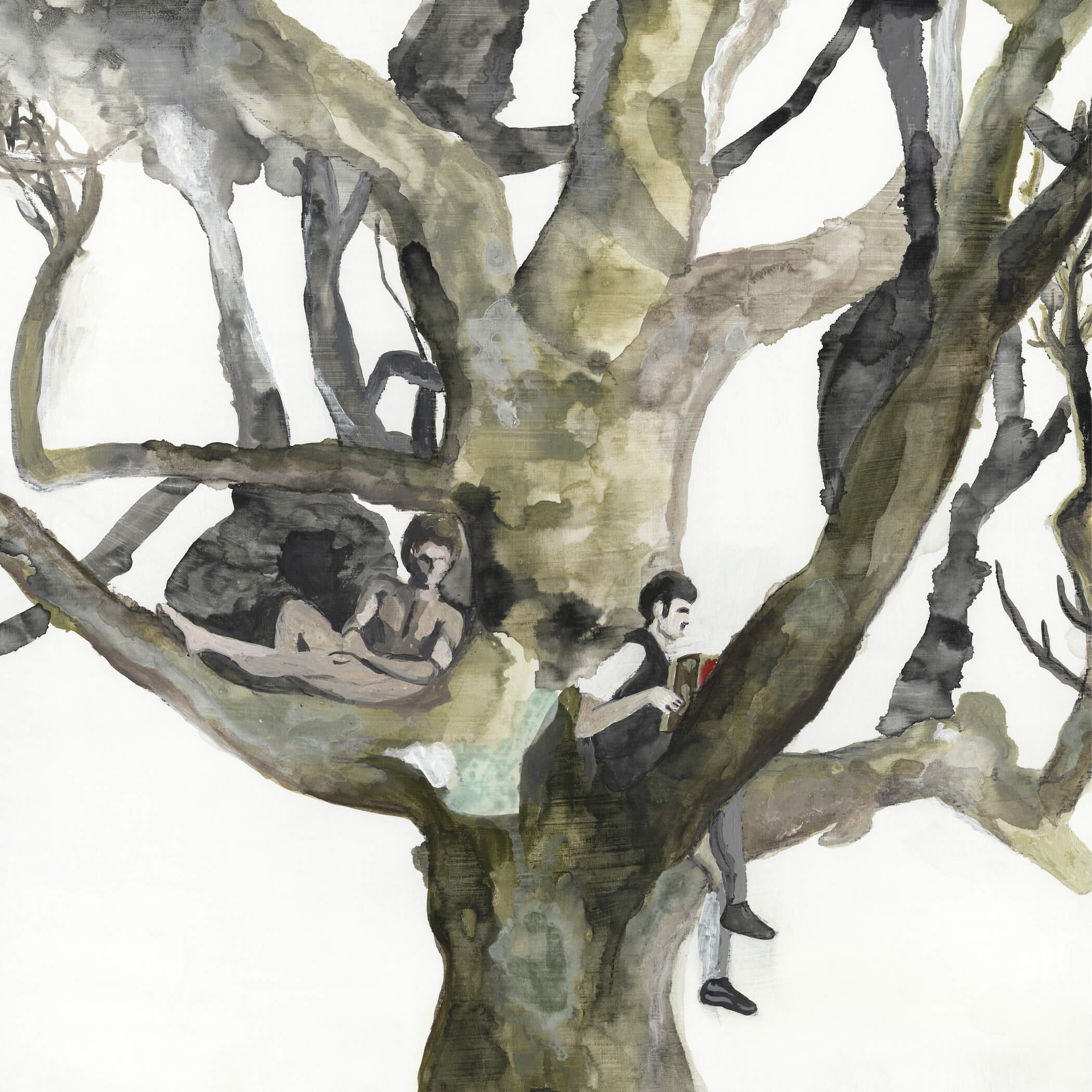
7
LABYRINTHITIS
Destroyer
Dan Bejar operates in a world of muted flamboyance, wherein everything is a gaudy spectacle except for the person doing the spectating. As Destroyer, his music is like being astral projected into a Studio 54 party or an Algonquin Round Table discussion in another dimension, where it’s hard to tell what exactly anyone is talking about, but everything is so ensconced in sophistication that precise comprehension hardly matters. But Bejar himself is the man in the middle of it all, observing the action and occasionally offering his thoughts but keeping his focus on others, namely various female muses. He dabbles in bygone musical trends like glam rock and smooth jazz, but it’s not weighed down by overt-winking or trying to reconfigure what a given genre means for the 21st century. In short, Dan Bejar is cool,” and that’s in a very limited definition of the word.
And few albums have altered the trajectory of veteran indie artists quite like 2011’s Kaputt. Bejar specializes in switching styles, going from the MIDI symphonies of Your Blues to the chamber rock glitz of Destroyer’s Rubies in just two years. And a move into something a little more saxophone-focused was no less believable. But I don’t think even Bejar – already an acclaimed and generally popular artist – was prepared for the kind of reception Kaputt would garner. It didn’t bring Destroyer to a level of fame greater than, say, being able to perform at larger theaters and getting moved up a line or two on the festival lineups. But Kaputt – if arguably not his best album – managed to feel like the culmination of everything Bejar had been working towards as an artist while also being the perfect entry into his world for new fans.
Everything post-Kaputt – excluding the Five Spanish Songs EP – has felt like it’s fed off of that album. Like its presence is looming in a way that wasn’t the case for Bejar before. There are distinctions that can be made between Poison Season, Ken, Have We Met, and now LABYRINTHITIS. But with each album, it’s hard to not be reminded of where it originated from. That’s not to besmirch these albums (all of which I like except for Ken which has never engaged me) but to note how Bejar, an artist known for shaking things up while always being himself, has found his groove, much like how a tavern fixture settles into his favorite barstool over time.
Over time, Bejar has drifted away from arguably his defining trademark: his lyrics. Whereas a single verse on Rubies or Streethawk: A Seduction could inspire a whole term paper, the language of LABYRINTHITIS feels far less crucial to its purpose. And that’s largely due to how selectively Bejar deploys it compared to before. Consider this: every pre-Kaputt Destroyer album – excluding This Night – introduced Bejar’s vocals within the opening seconds, sometimes before we got a chance to hear anything else. Since Kaputt, however, his songs build up before he slinks in. The setting hasn’t changed too much but he’s gone from the host mingling on the party floor to a slightly less reclusive Jay Gatsby.
To wit, it takes 55 seconds for Bejar to enter spacey opener “It’s In Your Heart Now,” and he’s not exactly providing “dueling cyclones jackknife”-style wonder, instead reciting the song’s title for over the band’s reverie. There’s something of a theme of displacement but Bejar’s vocals also feel like they could be looped like a house track and the effect would feel the same. Bejar’s taste isn’t in doubt, and the lush waves of guitar leaning into a distorted drone in the second half is invigorating. But it’s also hard to not wish Bejar felt more like an instigator and less like a cog.
But when the spotlight falls on him, Bejar shines and so does LABYRINTHITIS. The agitated arpeggiated synths on “Suffer” are certainly engaging in their own right, but Bejar’s declaration of inevitable suffering and the many ways it can happen take things up a notch. His swaggering vocals, mixed with the booming percussion and surging guitars make for what feels like the first arena-ready Destroyer song. One of the biggest talking points about Bejar – at least in years past – was about dislike of performing live. And that may still hold true – especially for an album that downplays his presence as much as this one does – but Bejar’s presence is an inherently compelling and charismatic one. And what makes “Suffer” or surprisingly emotional highlight “All My Pretty Dresses” stand out are in how he commands attention without turning himself into the only part of the spectacle.
Elsewhere, there’s some sense of Bejar repeating himself, including in song titling. 20-something years after the album Thief, we get “It Takes a Thief.” “Trouble in Dreams” had “The State,” now we have “The States.” Part of what makes Destroyer albums so fun is how meta they get – referencing Bejar songs from years past or ones yet to come up in the tracklisting. But LABYRINTHITIS occasionally feels like Bejar’s repeating himself without the playful awareness “Eat the Wine, Drink the Bread” comes across as a lesser version of Have We Met highlight “It Just Doesn’t Happen.” And as resonant as “All My Pretty Dresses” is, the mix of lonesome horns and shimmering guitars feels like it’s also been done better before. Unfair as it may seem, LABYRINTHITIS is hard to not grave on something of a curve because Bejar has excelled so many times over that something accomplished but familiar can feel underwhelming.
But what helps LABYRINTHITIS the most is the sense that Bejar is still a restless creative spirit, even if not all of his experiments work perfectly on the first test. The instrumental title track, with its samples of children’s voices, chirping birds, and “oh” vocals jumping up and down octaves, could fit into Music Has the Right to Children or Dead Cities, Red Seas, & Lost Ghosts. The spacey funk of June turns into a spoken word performance towards the end, but the less ornate Bejar gets, the more the rest of the band does. The stock bassline and drumbeats keep the guiro-and-scatting heavy “It Takes a Thief” from being the weirdo revue it needs to be, but Bejar is still trying things – even as simple as closing things with an earnest guitar ballad, and that can’t be discounted.
Speaking as someone who’s mainly been drawn to Destroyer for how inscrutable yet Bejar’s writing is, I understand that I shouldn’t expect every song or even every album to be “Bay of Pigs” level in terms of lyrical focus, and some of Bejar’s best songs – like the Kaputt title track are hardly lyrically deep. But LABYRINTHITIS, while overall accomplished, can seem like it’s holding back unnecessarily, and that a more constant presence from Bejar would make a world of difference. One repeated line from “June” sticks out: “Fancy language dies, and everyone’s happy to see it go.” Well, not everyone.
Purchase LABYRINTHITIS by Destroyer HERE
Latest Reviews
Tracks
Related Albums
Related News
Advertisement
Looking for something new to listen to?
Sign up to our all-new newsletter for top-notch reviews, news, videos and playlists.














